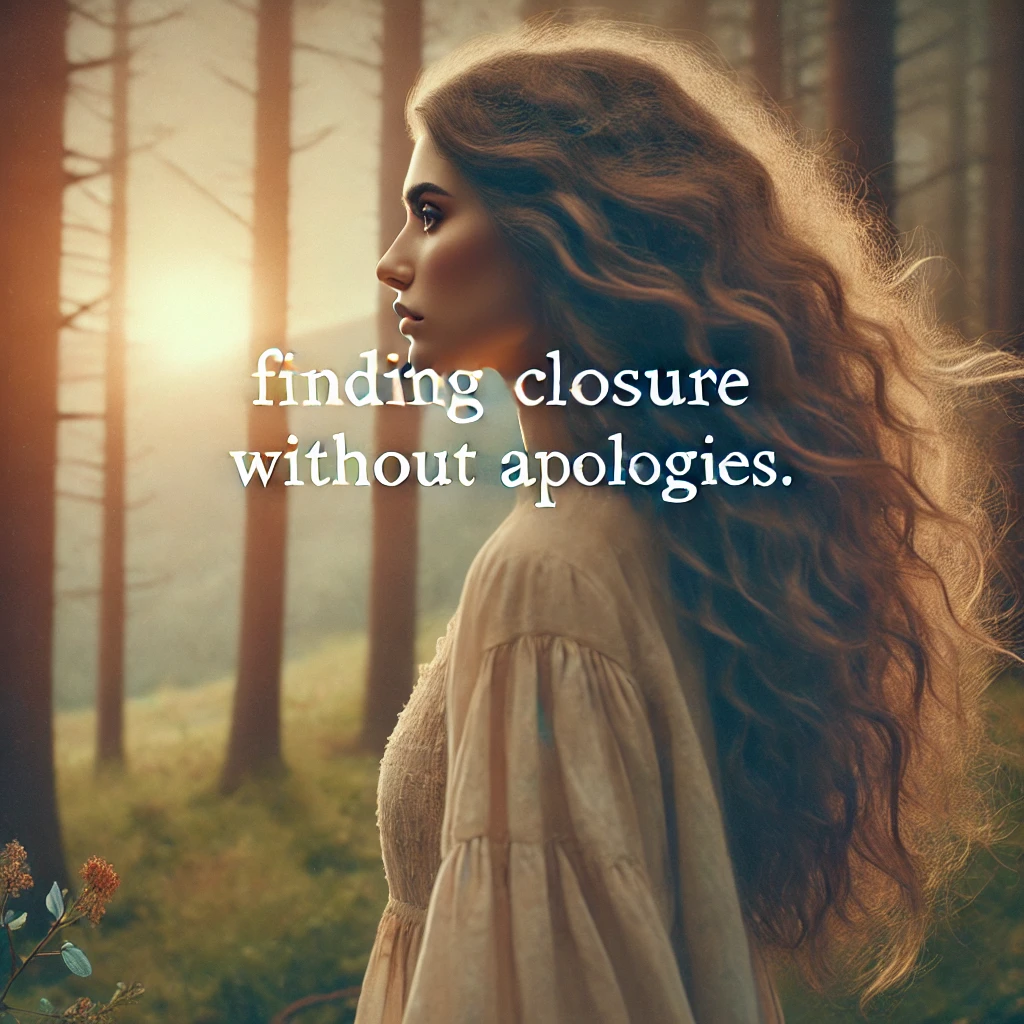Understanding the Nature of Unresolved Apologies
In navigating the complex emotional terrain of waiting for an apology that may never come, it is imperative to understand the psychological and emotional ramifications of this experience. An apology serves multiple roles; primarily, it acts as a form of validation, providing acknowledgment of the hurt inflicted upon an individual. Psychological theories suggest that the need for validation is a fundamental human desire, closely tied to our sense of self-worth and emotional well-being.
When an apology is withheld, it can leave individuals feeling trapped in a state of limbo. The absence of acknowledgment can foster feelings of invalidation and prevent emotional closure. According to experts in psychology, this feeling of being stuck is a common but deeply unsettling emotional response. Renowned psychologist Carl Rogers emphasized the importance of validation in his theory of unconditional positive regard, suggesting that recognition and validation are crucial for emotional growth and self-actualization.
Moreover, unresolved apologies can contribute to prolonged psychological distress. Dr. Harriet Lerner, a clinical psychologist and expert on emotional communication, posits that the absence of an apology can create inner turmoil that manifests as unresolved anger, guilt, or sadness. This internal struggle often exacerbates feelings of hurt, making the path to emotional recovery arduous and complex.
Understanding the nature of unresolved apologies is crucial for personal growth and emotional resilience. It helps to recognize that waiting for an apology is often less about the act of apology itself and more about the emotional closure and validation that comes with it. Therefore, taking steps to internally validate one’s own experience and seeking alternative paths to closure can be essential in overcoming the emotional barriers posed by an unresolved apology.
The Importance of Self-Validation
When facing the absence of an apology, the importance of self-validation comes to the forefront. Acknowledging and accepting one’s feelings without relying on external validation is an essential step toward emotional well-being. Self-validation allows individuals to validate their own experiences and emotions, fostering a greater sense of inner peace and resilience.
One effective strategy to achieve self-validation is journaling. By documenting your thoughts and feelings, you create a tangible record of your emotional journey. This practice can provide clarity, facilitate self-reflection, and help in recognizing patterns in your reactions. Writing down your emotions serves as an acknowledgment of your inner state, enabling you to process them constructively.
Seeking therapy is another vital avenue for self-validation. Engaging with a professional therapist can provide a safe space to explore your feelings and receive objective feedback. Therapy encourages self-awareness and offers tailored strategies to cope with the absence of an apology. With the guidance of a trained therapist, individuals can develop healthier coping mechanisms and reinforce their sense of self-worth.
Talking to trusted friends is equally crucial. Sharing your experiences with empathetic and supportive friends can help reinforce your emotions’ legitimacy. Friends can offer perspectives, support, and validation that bolster your own understanding and acceptance of your feelings. This communal support acts as a reminder that your emotions are valid and meaningful, even without an apology.
Practicing self-compassion is a cornerstone of self-validation. It involves treating oneself with the same kindness and understanding that one would offer to a friend in distress. Self-compassion promotes forgiveness and reduces self-criticism, enabling a person to nurture their emotional well-being. By embracing self-compassion, individuals validate their own suffering and embark on a path towards healing.
The power of self-reflection and emotional acknowledgment in finding personal peace cannot be overstated. By actively engaging in these practices, individuals lay the groundwork for healing and self-acceptance. Self-validation empowers individuals to move forward with greater emotional resilience, regardless of the absence of an apology.
Techniques for Emotional Release
When apologies never come, finding emotional release can be instrumental in achieving closure. Several techniques can aid in processing and releasing pent-up emotions, leading to a sense of inner peace. Mindfulness practices are a powerful tool to cultivate a present-focused awareness and reduce emotional distress. Engaging in regular mindfulness activities, such as guided meditations or breathwork, allows individuals to confront and release negative emotions more effectively.
Guided meditations, specifically designed to promote emotional healing, can be a sanctuary for those facing unresolved feelings. These meditative practices often involve focusing on breath, visualizing a safe space, and gently working through emotional blocks. Breathwork, another impactful practice, involves controlled breathing exercises that help regulate the nervous system, reduce stress, and facilitate emotional release.
Creative outlets offer another avenue for processing emotions. Writing, painting, or playing music can serve as expressive mediums to externalize and understand one’s emotions. Journaling, for instance, allows for the articulation of thoughts and feelings that may otherwise remain unexamined. Similarly, creating art or music can be therapeutic, offering a way to channel complicated emotions into something tangible and meaningful.
Physical activities should not be overlooked when considering techniques for emotional release. Practices such as yoga or regular exercise can harmonize the mind and body, fostering a state of emotional equilibrium. Yoga, which combines physical postures, breathwork, and meditation, is particularly beneficial for managing stress and facilitating emotional release. Exercise, in general, triggers the release of endorphins, which naturally uplift the mood and help alleviate emotional burden.
By integrating these methods—mindfulness practices, creative expression, and physical activities—individuals can work through unresolved emotions and gradually find closure, even in the absence of an apology. These techniques offer various pathways to emotional release, supporting overall well-being and resilience.
Moving Forward and Building Resilience
In the journey towards personal peace and growth, it is crucial to develop strategies for moving forward, even in the absence of an apology. Setting boundaries plays a vital role in this process. Implementing clear, healthy boundaries can help protect yourself from further hurt and facilitate emotional independence. Distancing oneself from the source of hurt, when necessary, is another essential strategy. By minimizing contact with individuals or situations that trigger pain, you create a safe space for healing and self-reflection.
Forgiveness is another powerful tool in the pursuit of emotional wellbeing. It is important to note that forgiveness does not necessarily mean reconciling with the one who has caused hurt; rather, it is about letting go of the bitterness that stifles personal growth. This act of letting go is for your benefit, allowing you to move past negativity and focus on your own personal peace.
Building a positive mindset involves actively seeking out and embracing success stories and affirmations. Surrounding yourself with positive influences and regularly practicing self-affirmations can significantly boost your resilience. Engage in resilience-building exercises such as mindfulness meditation, journaling, or physical activity to strengthen your emotional fortitude. These practices can help you remain grounded, focused, and optimistic despite past wounds.
To cultivate a future that is not anchored in past hurts, consider taking actionable steps towards holistic well-being. These steps might include pursuing new hobbies, fostering supportive relationships, or seeking professional guidance if needed. By prioritizing self-care and emotional independence, you can pave the way for a life that is rich in personal fulfillment and freedom from past grievances.
In this ongoing journey, remember that healing takes time and effort. Progress may be gradual, but by consistently applying these strategies, you will build the resilience to move forward and embrace a happier, more fulfilling future.
Emma’s Journey to Finding Closure
For Emma, waiting for an apology that never came was one of the hardest parts of her emotional recovery. After her breakup, she desperately wanted an acknowledgment from her ex-partner. She believed that an apology would give her the closure she needed to move on. But as weeks turned into months, Emma realized that the apology wasn’t coming.
At first, Emma felt trapped—stuck in her pain, constantly replaying the hurtful moments in her mind. She yearned for validation, but as time passed, she began to understand that closure wasn’t something her ex could give her. Emma realized she had to find closure within herself.
Self-validation became Emma’s key to healing. She turned to journaling, pouring her emotions onto the page, and seeking therapy to explore her unresolved feelings. With the support of a therapist, Emma began to acknowledge her pain and accept that she deserved healing—even without an apology.
Through self-compassion, Emma started to release the anger and sadness that had been weighing her down. She learned to forgive, not for her ex, but for her own peace of mind. Forgiveness became a way for Emma to reclaim her power and move forward with her life, free from the burden of waiting for something that might never come.
Emma’s journey to finding closure reminds us that while an apology can offer validation, true healing comes from within. By embracing self-validation, practicing forgiveness, and building emotional resilience, Emma was able to find peace, and she shows that anyone can do the same—apology or not.
This version incorporates Emma’s journey at the end, highlighting how she found closure without waiting for an apology. Let me know if you’d like any further modifications or adjustments!



